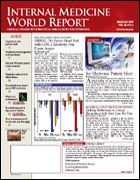Publication
Article
Internal Medicine World Report
Novel Antibiotic Shows Promise for Acute Bacterial Sinusitis
Author(s):
From the Infectious Diseases Society of America
TORONTO, Canada—Two new studies presented at the Infectious Diseases Society of America annual meeting suggest that cethromycin (Advanced Life Sciences), an investigational ketolide, is well tolerated and effective at varying dosages in patients with acute bacterial sinusitis.
Ketolides, semisynthetic derivatives of erythromycin, have been shown to overcome the macrolide resistance mechanisms found in the 2 key pathogens, Streptococcus pneumoniae and Streptococcus pyogenes. Ketolides also appear to have improved potency and longer posttreatment effects, while maintaining the antibacterial spectrum activity of the macrolide class.
The first study was a phase 2, double-blind, randomized, parallel-group, multicenter trial that included 292 patients (mean age, 41 years; 65% women) who had a confirmed diagnosis of acute bacterial sinusitis. Patients were randomized to 1 of 3 dosages of cethromycin—150, 300, or 600 mg/day—for 10 days.
Overall, the cure rate (defined by clinical response from the clinically evaluable population) with the 300-mg daily dose was 83% (70/84), and the radiographic success rate was 86%. Both the 150- and 300-mg doses provided significantly better clinical and radiographic responses than the 600-mg dose. The researchers say this appeared to be due to increased side effects at the highest dosage, leading to poorer compliance.
Also presented at the meeting were results from a phase 2/3 study that compared the safety and efficacy of cethromycin, 150 mg once daily versus 150 mg twice daily, in 609 patients with acute bacterial sinusitis (mean age, 39 years; 50% women).
Both dosing regimens were effective in resolving or improving clinical signs and symptoms of acute bacterial sinusitis and in eradicating the target pathogens. The clinical cure rates in the evaluable population were 87% (229/263) in the once-daily dosing group and 88% (227/258) in the twice-daily dosing group.
These results, combined with previous clinical trials that investigated community-acquired pneumonia and acute bacterial exacerbations of chronic bronchitis, support the use of cethromycin for the treatment of acute bacterial sinusitis.






